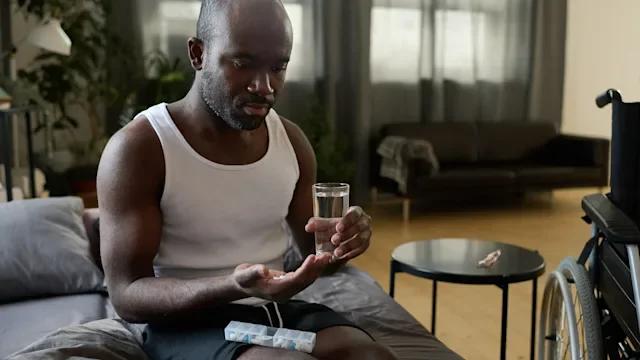Key takeaways:
Vitamin D keeps your bones strong and helps your immune system work properly. Low vitamin D levels are associated with a higher risk of certain types of cancer.
Research is ongoing, but right now there’s no evidence that taking vitamin D helps prevent cancer. There’s a slight chance that vitamin D supplements can reduce the risk of death from cancer, but results are mixed.
There is no one-size-fits-all advice for taking vitamin D or other supplements after a cancer diagnosis. Some vitamins and supplements can interact with your cancer treatment or raise your risk of side effects. Talk to your oncologist to determine what’s best for you.
Save on related medications
Cancer has many causes — from inherited genes and tobacco smoke to sun exposure and pollution. And sometimes cancer appears even without a known cause. So it’s no wonder that there’s a lot of interest in whether certain vitamins and supplements can help prevent or treat cancer. And one that often comes up is vitamin D.
Vitamin D helps your body absorb calcium to support healthy bones. It also plays a role in inflammation, your immune system, and cell growth. But is there a connection between vitamin D and cancer? And should you take vitamin D if you’re receiving chemotherapy?
What’s the connection between vitamin D levels and cancer?
Researchers are still studying the relationship between vitamin D and cancer. We’ll summarize some of what scientists have learned so far.
Search and compare options
More sun exposure is associated with a lower risk of some cancers
A review of studies across several countries found that areas with more sun exposure had a lower incidence of certain types of cancer, including:
Bladder cancer
Breast cancer
Cervical and vulvar cancer
Colon and rectal cancer
Endometrial cancer
Stomach cancer
Lung cancer
Ovarian cancer
Pancreatic cancer
Renal (kidney) cancer
Hodgkin’s and non-Hodgkin's lymphoma
Your body makes vitamin D when it's exposed to sunlight. This led scientists to consider that the lower cancer levels in areas with more sunshine could be due to higher levels of vitamin D.
Low vitamin D levels are associated with an increased risk of certain cancers
Low vitamin D levels are associated with an increased risk of certain cancers in some studies. But often, the results are mixed and can vary depending on the type of cancer.
Most studies show a higher risk of breast cancer in people with low vitamin D levels. And higher vitamin D levels are associated with a better breast cancer survival rate, lower risk of triple negative breast cancer, and lower risk of relapse. But other studies, including a review of over 20,000 people, show no association between vitamin D levels and the risk of developing breast cancer. So the connection between vitamin D levels and breast cancer is unclear.
Most studies show an association between low vitamin D levels and a higher risk of colon cancer. And as with breast cancer, higher vitamin D levels are associated with a higher survival rate in people with a colon or rectal cancer diagnosis.
Read more like this
Explore these related articles, suggested for readers like you.
Several studies have also found a link between low vitamin D levels and a higher risk of prostate cancer. And higher vitamin D levels seem to lower the risk of prostate cancer worsening or spreading. But other studies found that higher vitamin D levels were associated with an increased risk of developing nonaggressive prostate cancer. So it’s unclear what role vitamin D plays in prostate cancer at this time.
Most studies show a link between low vitamin D levels and certain lymphomas. Not only is low vitamin D associated with a lower survival rate, but it may also make treatment less effective for these cancers.
There’s some evidence that low vitamin D levels may also raise the risk of some cancers of the mouth, bladder, and lungs. But more studies are needed to know for sure.
Does taking vitamin D help prevent or treat cancer?
If low vitamin D levels are associated with an increased risk of some cancers, then it’s logical to think that taking vitamin D would reduce your risk of cancer. But the evidence doesn’t seem to show that taking vitamin D helps prevent cancer in most cases.
A 5-year study, called the VITAL study, found that there doesn’t seem to be a relationship between taking vitamin D and the overall risk of getting cancer. But for people without excess body weight who develop cancer, it may slightly lower the risk of advanced cancer.
A 2019 review of clinical studies also found that taking vitamin D may lower your risk of death from cancer, even though it didn’t change your risk of getting cancer. A more recent review found that vitamin D supplements had no effect on the risk of getting cancer or the risk of death from cancer.
That being said, there may be a difference in how taking vitamin D affects certain types of cancer. For example, one study found that taking vitamin D reduced the risk of relapse or death for some cancers of the digestive tract. But it was only effective for cancers that tested positive for a specific protein.
At this time, the evidence doesn’t support taking vitamin D to prevent or treat cancer. But the potential benefit of vitamin D remains of great interest to scientists and healthcare professionals. There are a number of ongoing clinical studies looking at the effect of vitamin D supplements on certain cancers. So it’s possible there’s potential we haven’t yet discovered.
Should you take vitamin D if you have cancer or while receiving chemotherapy?
You should only take a vitamin D supplement if your healthcare team recommends it.
Your oncologist may also recommend a vitamin D supplement to help prevent bone loss caused by certain cancer treatments. And vitamin D in an oral gel form may help prevent mouth and gum sores (mucositis), a common side effect of chemotherapy and radiation.
Keep in mind that vitamin D isn’t safe for everyone. Vitamin D can raise your calcium levels, which can cause nausea, muscle weakness, and kidney stones. Some cancers can also cause high calcium levels, so taking vitamin D may worsen this side effect. Too much vitamin D can cause kidney problems, heart problems, and even death. So be sure to check with your oncologist before taking it to make sure it’s safe for you.
How do you know if your vitamin D levels are low?
Low vitamin D levels are common in people living with cancer. If this is a concern for you, ask your oncologist for a blood test to check your vitamin D level. They’ll be able to recommend the right vitamin D dosage for you if it’s needed.
Other factors can increase your risk of low vitamin D levels, such as:
Limited sunlight exposure
Older age
Darker skin tone
Larger body size
Inflammatory bowel disease
History of gastric bypass surgery
Medications, such as antiseizure medications and some blood pressure medications
Chronic kidney or liver disease
Keep in mind that spending 10 minutes a day in the sunshine is typically enough to make the vitamin D you need. And regular exercise is recommended not only to help prevent cancer, but to improve stress levels and combat fatigue during treatment. So taking a short walk outside can help you get the best of both worlds.
What other supplements are recommended if you’re being treated for cancer?
When it comes to taking vitamins and supplements, there’s not a one-size-fits-all recommendation for cancer. It depends on the type of cancer you have, your treatment plan, and other factors.
Keep in mind that even though supplements are often made from “natural” products, that doesn’t mean they’re risk free. Some vitamins and supplements can make cancer treatments less effective. Others can raise your risk of bleeding or other side effects.
The best way to ensure you’re getting the vitamins you need is to focus on what you’re eating. You can also talk to your oncologist about complementary and integrative treatment options. These customized services can help you find safe options that support your cancer treatment, such as acupuncture and meditation. They can also provide nutrition counseling and let you know if any vitamins or supplements are a safe option.
The bottom line
Vitamin D keeps your bones strong and your immune system healthy. Low vitamin D levels are associated with a higher risk of some cancers. Research is ongoing to determine if vitamin D supplements may be helpful for specific cancers. But so far, taking vitamin D hasn’t been shown to reduce your overall cancer risk.
You should only take vitamin D if your levels are low and your healthcare team recommends it. Taking too much vitamin D can be harmful to your health. When it comes to fighting cancer, you’re generally better off focusing on a nutritious diet and regular exercise than vitamins or supplements. But your oncologist can recommend complementary and integrative treatment options that are safe for you if you’re interested in trying them.

Why trust our experts?



References
American Cancer Society. (2021). Which complementary methods are likely safe?
American Cancer Society. (2023). Are dietary supplements safe?
Atoum, M., et al. (2017). Vitamin D and breast cancer: Latest evidence and future steps. Breast Cancer: Basic and Clinical Research.
Bakr, I. S., et al. (2021). Vitamin D oral gel for prevention of radiation-induced oral mucositis: A randomized clinical trial. Oral Diseases.
Bell, A., et al. (2023). Oral mucositis. StatPearls.
Cassell, A., et al. (2024). Unlocking the potential-vitamin D in prostate cancer prevention. World Journal of Clinical Oncology.
Chandler, P. D., et al. (2020). Effect of vitamin D3 supplements on development of advanced cancer. Journal of the American Medical Association Network Open.
ClinicalTrials.gov. (n.d.). Search results for cancer, vitamin D.
Feng, Q., et al. (2017). Circulating 25-hydroxyvitamin D and lung cancer risk and survival. Medicine.
Grant, W. B. (2012). Ecological studies of the UVB–vitamin D–cancer hypothesis. Anticancer Research.
Harvie, M. (2014). Nutritional supplements and cancer: Potential benefits and proven harms. American Society of Clinical Oncology Educational Book.
Kanno, K., et al. (2023). Effect of vitamin D supplements on relapse or death in a p53-immunoreactive subgroup with digestive tract cancer. Journal of the American Medical Association Network Open.
Keum, N., et al. (2019). Vitamin D supplementation and total cancer incidence and mortality: A meta-analysis of randomized controlled trials. Annals of Oncology.
Kokila, G., et al. (2017). Cancer and physical activity. Journal of Oral and Maxillofacial Pathology.
Manson, J. E., et al. (2018). Vitamin D supplements and prevention of cancer and cardiovascular disease. The New England Journal of Medicine.
Maturana-Ramirez, A., et al. (2022). Hypovitaminosis D, oral potentially malignant disorders, and oral squamous cell carcinoma: A systematic review. Medicina Oral, Patologia Oral, y Cirugia Bucal.
McCullough, M. L., et al. (2019). Circulating vitamin D and colorectal cancer risk: An international pooling project of 17 cohorts. Journal of the National Cancer Institute.
MedlinePlus. (2024). Vitamin D deficiency.
Na, S. Y., et al. (2022). Vitamin D and colorectal cancer: Current perspectives and future directions. Journal of Cancer Prevention.
National Cancer Institute. (n.d.). Lymphoma.
National Cancer Institute. (2023). Vitamin D and cancer.
National Institutes of Health. (2023). Vitamin D. U.S. Department of Health and Human Services.
Peixoto, R. D., et al. (2022). Vitamin D and colorectal cancer – a practical review of the literature. Cancer Treatment and Research Communications.
Potre, C., et al. (2023). A systematic review assessing the impact of vitamin D levels on adult patients with lymphoid malignancies. Current Oncology.
Sturgeon, K. M., et al. (2019). Cancer- and chemotherapy-induced musculoskeletal degradation. Journal of Bone and Mineral Research Plus.
Travis, R. C., et al. (2019). A collaborative analysis of individual participant data from 19 prospective studies assesses circulating vitamin D and prostate cancer risk. Cancer Research.
Vakiti, A., et al. (2023). Malignancy-related hypercalcemia. StatPearls.
Visvanathan, K., et al. (2023). Circulating vitamin D and breast cancer risk: An international pooling project of 17 cohorts. European Journal of Epidemiology.
Welsh, J. (2018). Vitamin D and breast cancer: Past and present. The Journal of Steroid Biochemistry and Molecular Biology.
Zhang, H., et al. (2015). Vitamin D deficiency and increased risk of bladder carcinoma: A meta-analysis. Cellular Physiology and Biochemistry.
Zhang, R., et al. (2022). Association between vitamin D supplementation and cancer mortality: A systematic review and meta-analysis. Cancers.

















